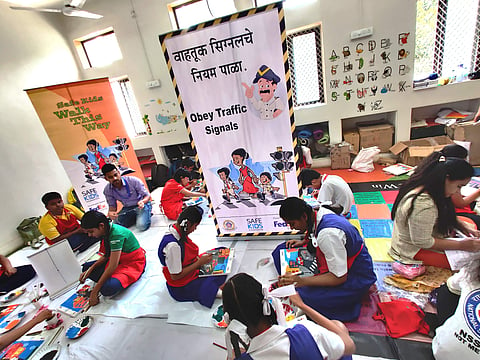

According to a 2017 report, about 9,400 children die every year in India due to road accidents. There are plenty of reasons why - from lack of protective gear to lack of road safety awareness. In order to mitigate this growing concern, Rupa Kothari started the Safe Kids Foundation in 2007 with one mission - to prevent unintentional injuries to children.
The organisation focuses on creating awareness among parents, teachers and children on how to prevent these injuries. They conduct programmes on road safety and home safety. "More than 12 lakh children globally die on the roads every year and so many families are torn apart. As an organisation, we want to create a safer environment for children so that they can live healthy and long lives. We also tie-up with various governments, medical associations, communities and promote awareness on preventive measures," says Rupa.
The team works around four main pillars - programme, research, advocacy and awareness. Rupa explains, "When we talk about road safety, we talk about safe ways of walking, what parents should be aware of when they send their children out. We try to bring about a change in attitude and behaviour of children on roads." While road and fire accidents are the most common causes of injury, in coastal areas and places with water bodies, drowning is also a major cause.
Safe Kids has reached over 24 lakh children through their various programmes so far. Some of the programmes include passenger safety, safe teen drivers and trauma care and are conducted in cities like Mumbai, Thane, Pune and Ahmedabad. They also have exhibitions, essay writing, drawing, poster making and games to educate the children. As they are not allowed to conduct these activities on the road, they resort to creating road scenarios within the school premises for their activities.
Rupa adds that in smaller towns and suburbs, many children ride bicycles to schools. Again, in colleges, some students used motorised vehicles. So a lot of their programmes focus on what preventive measures can be taken while riding on roads, especially during peak hours. The Safe Teen Drivers programme was started on behalf of the Maharashtra Police and Halliburton Charitable Foundation, wth support from NSS and 17 colleges.
In order to assess their impact, Safe Kids has pre and post programme questionnaires and so far they have witnessed an 80-90 per cent improvement in the behaviour of children on roads.
In the near future, Safe Kids plans to expand their Trauma Care programme. "We will connect more with youth and youth trainers, provide basic information like bystanders care and basic life support. This will be in collaboration with hospitals. We have tied up with two hospitals in Mumbai so far," says Rupa.
